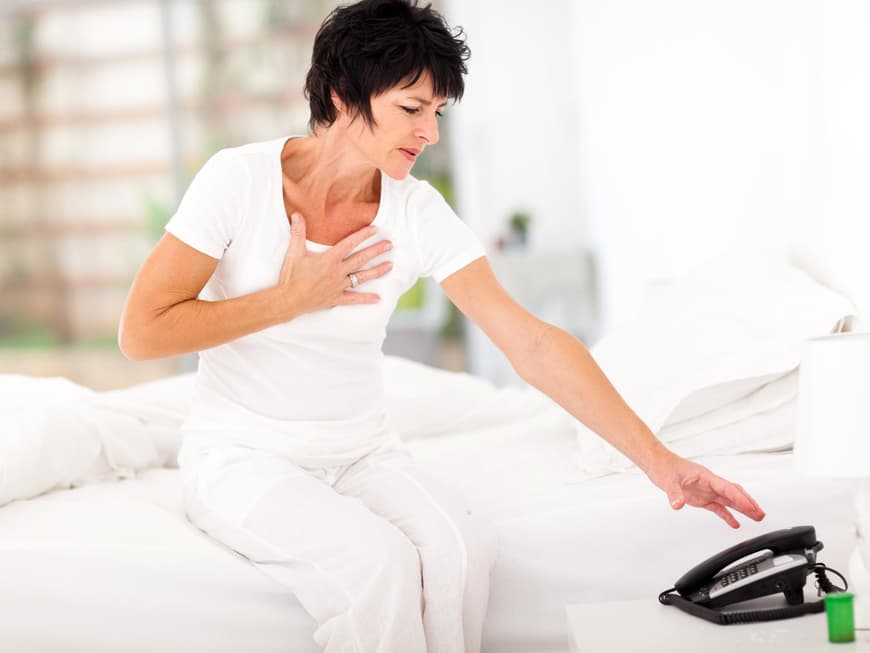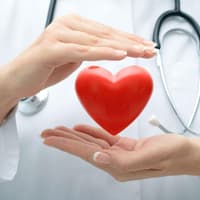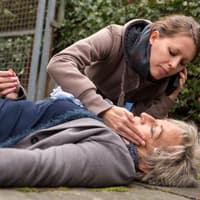
Petra (54) has just moved her boutique to a better location and wants to put everything on the new shelves for the store opening on Friday. Suddenly she feels an unfamiliar sharp pain in her upper abdomen. She breaks out in a profuse sweat and feels so nauseous that she has to vomit. She suspects food poisoning and calls her sister Anne to drive her home. When Anne arrives at the store door ten minutes later, she is shocked: Petra is deathly pale.
Anne does the right thing: as a doctor's assistant, she knows how to recognize a heart attack. Her sister's symptoms point to it. Because women don't always show the typical symptoms such as severe chest pain. So she presses 112 on her cell phone to call the emergency doctor. Petra can be admitted to hospital in good time, where treatment for the heart attack begins immediately.
Too often people hesitate to call
In Germany, around 290,000 people suffer a heart attack every year. Almost one in three dies before reaching the hospital. The reason: too many people misinterpret the symptoms of a heart attack and hesitate to call the emergency doctor. As a result, too much time passes before the heart attack is treated.
Too many people in our country are still unaware that every minute counts in the event of a heart attack and wait too long: but the faster the patient is treated in hospital, the better the chances of survival and the lower the risk of serious damage to the heart, including cardiac insufficiency with considerable loss of quality of life,
explains heart specialist Prof. Dr. Heribert Schunkert from the German Heart Center Munich and member of the advisory board of the German Heart Foundation.
This is why it is so important to call the emergency doctor straight away if a heart attack is suspected and not the family doctor first.
Heart muscle tissue is lost
In a heart attack, one of the coronary arteries, which are responsible for supplying the heart with oxygen and nutrients, is blocked by a blood clot ("thrombus"). Part of the heart muscle is then cut off from the oxygen supply. Among other things, this can lead to a dangerous cardiac arrhythmia, ventricular fibrillation, which can lead to total circulatory failure. The longer a heart attack lasts, the more heart muscle tissue is irretrievably lost.
However, if the emergency medical team is on the scene quickly, treatment of the heart attack can begin immediately and the patient - possibly after their cardiovascular system has been stabilized to some extent - is taken to a hospital with acute care.
You should therefore always call 112 if you see any of the following alarm signs:
● The affected person feels severe chest pain lasting longer than five minutes, which may radiate to the arms, shoulder blades, neck, jaw
or are localized in the upper abdomen.
● There is a strong feeling of tightness, severe pressure, burning in the chest, the affected person suffers from shortness of breath
● Nausea, nausea and anxiety are also possible.
● The affected person may experience a feeling of weakness (even without pain) or may be unconscious
● The affected person has a pale, sallow complexion and breaks out in a cold sweat.
● A particular alarm sign is when someone wakes up at night with chest pain.
● Pronounced shortness of breath is also an alarm sign.
The alarm signs are often different in women. This is why a heart attack is often recognized too late in women.
● In women, shortness of breath, nausea, back pain, pain in the upper abdomen, nausea and vomiting are more common alarm signs than in men.
● If chest pain - in both women and men - occurs with minimal exertion or at rest, action must be taken just as quickly as in the case of a heart attack.
Until the rescue team arrives, the patient should lie down in a half-sitting position on a sofa or a comfortable armchair. Relatives should open the window to provide plenty of air and reassure the patient until the rescue team can start treating the heart attack.






